 I have a short list of thoughts/ideas I’m pondering. This list keeps important objectives at the front of my mind lest I forget. : )
I have a short list of thoughts/ideas I’m pondering. This list keeps important objectives at the front of my mind lest I forget. : )
In October I wrote this on the list – “How can I strengthen my relationship with each grandchild and great-grandchild despite age, technology, or distance.” There are impediments of time, finances, the ability to travel, different lifestyles, and beliefs, kids who are adults or teens, and technology, which often gets in the way of real connection.
With the grands I live with, I have been consistently doing things I taught parents over a decade ago – random touch, active listening, smiling, stopping, and looking at them when they’re talking to me. They’re all teens now and crafts, reading aloud, or chasing through the house have ended. Bummer!
Technology, despite texting, can get in the way of real connection. Recently, when I picked her up from school, my 14-year-old granddaughter asked me how I felt about the election, and we had a good conversation. SCORE! Today when I picked her up from school, she shared something that’s coming up in her life that she’s excited about. SCORE! My ten-year-old advice is making a difference in our relationship!
I’ve lived with these grands for over fourteen years, and I miss the fun we had when they were little, and despite their being teens, I want to do something fun with them now. I had an idea last week that I have been mulling over – “This Nov. throw a cookie party. Invite the kids and their friends. Send an invitation and ask them to RSVP. Then set them up to bake and decorate a few kinds of cookies that they take home.” I have decided to follow through on this idea. Their mom, Jodie, when asked, said they might not RSVP. It may be just me. : ) It will be an experiment. However, if it goes off well, it will be a connection moment, a memory maker, and fun. I will let you know how it goes.
Most of my grands live far away and I see them once every two years at our family reunion, which is always a huge success and so much fun. But once every two years isn’t much. I text those with phones and they respond. I ask questions and they answer, but texting isn’t all that fun or meaningful. Phone calls with the adult grands occasionally work, but they’re busy and often on the run. So am I! Nevertheless, I have each name on a list and reach out in one way or another each month.
Phone calls with the younger grands have been a bust even when we use apps that let us see one another. They only connect for a few minutes and then are off. It doesn’t hold their attention long, so we quit doing it a few years ago.
Despite that, my youngest daughter and I have decided to have a face-to-face conversation with her three kids once a month, ages 12, 8, and 5. We know it will be short, but once a month, for five/ten minutes, beats once every two years.
Gifts, although loved by kids, are not the same as connecting no matter how amazing or expensive. I know this from experience. My mom’s parents divorced when she was three. She rarely got to see her biological mom and by the time she was an adult, didn’t want to. However, Grandma Walker sent us gifts every birthday and Christmas. I loved her for it but never saw her until I was an adult, and then only twice. I missed having a relationship. I wish we had talked on the phone or been able to see each other, even if only once every two years. I should have made more effort, but you don’t know what you don’t know.
A few weeks ago, I made a call to my WA. Grands, Grandma Liesl, to see how they make it work. Her husband is a pilot, so they are lucky and can visit a few times a year. She had great reminders for me.
The First Reminder
When I am in WA, I do bed duty. I read a chapter in a book to my three grands and ask two questions – what is the best thing that happened today and what was hard? That leads to interesting if short, conversations. As I thought about it, I realized I could do this on the monthly call we’re instituting. Talking to Liesl got me to visit with Kate about the possibility. As I mentioned, we are returning to a call a month and will take whatever we can get from it, short or long.
The Second Reminder
When I was a mom of seven, I would occasionally write letters to my kids, even when they lived at home. Some of them kept the letters for years. I could say how much and why I loved them, and they could read and reread. I continued to do this when they were grown, until recently.
Since my first grandchild was born, I have sent cards with notes and real letters to all my grands. I would stick a piece of gum inside and became known as the Gum Grandma. Then one of my peers told me nobody cares about cards and letters anymore and I wasted my time and money. I reached out to my readers and got a far different story from them. I kept it up for a few more years.
But technology kept advancing and I worried that this way of connecting had become outdated. For the last year or so I stopped doing it. Liesl reminded me that our mutual grands LOVE my letters and cards. She reminded me that they hang them on their walls. She said, “When I am there, they tell me you’re the Gum Grandma.” I had to laugh because they told me she was the Dancing Grandma. They put on music and dance. : )
Then Liesl shared what one of her adult kids, Curtis, said recently. “When you only send cards and not letters, I can’t reread them.” What, this from a grown man who uses all the available tech? He wants letters from his mom so he can reread them!
I am returning to my retro ways. I’m going to send cards and letters to my CA. Grands, and my CO. Grands and Great-grands. They, like my WA. Grands, care about them, even those who are teens or adults. (P.S. My daughter Kate reminded me to keep the letters short. LOL)
As I pondered this idea of connecting, I had a splendid idea on one of my daily walks. The idea was to include an anecdote from my life, Don’s, or my mother’s life in each card or letter. I know that hearing my stories will bond us over time. This will be meaningful to my family. When I share a school experience I had, some will relate, whether it was happy or sad. If I share a change I made, something scary I dealt with, or how I grew, it will plant a seed for them.
As I mentioned in an article called My Magnificent Birthday Gift on 2-28-21, if we give it all we’ve got as parents or grandparents, learn a little here and a bit more there, and then implement; if we remain consistent and speak kindly to ourselves as we change and grow, then it will be enough. As our children and grands watch us and observe our progress, we will give them a legacy to follow. There isn’t much that we can provide that is more powerful.
As my granddaughter Mary, who is almost 15, said a few years ago and repeated just this month, “Grandma, you and I are alike.” She was telling me about middle school. Then she said, “You were like that too, right grandma.” She remembered a story I told her when she first entered these hard years. Knowing that we are alike has given her heart. As she watches me, it is confirmed to her that if Grandma could manage middle school and remain herself, so can I.
Whether you’re a parent or grandparent, other relative, or friend/neighbor, we all have children we want to connect with. Some are close and others are far away. Some are small, some are teens, and some are adults, but as we saw in Curtis’s comment to his mom, they want to connect with us because they learn from us and feel our love. If you are close or far away from your children or grands find a way to connect consistently, whether the method is old-fashioned or more mainstream. What they take away from your efforts is an example of growth and that they mean something to you!
It will matter. It will say, you are in my thoughts, you are loved, you matter to me!

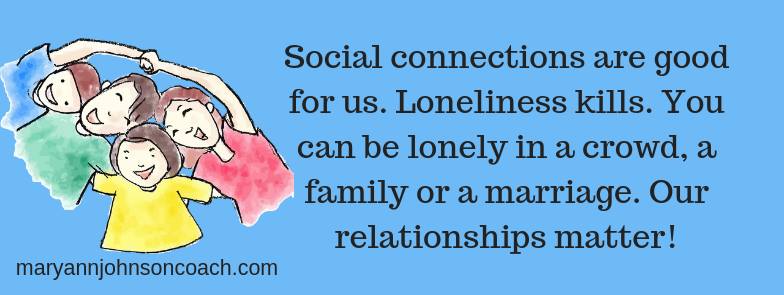
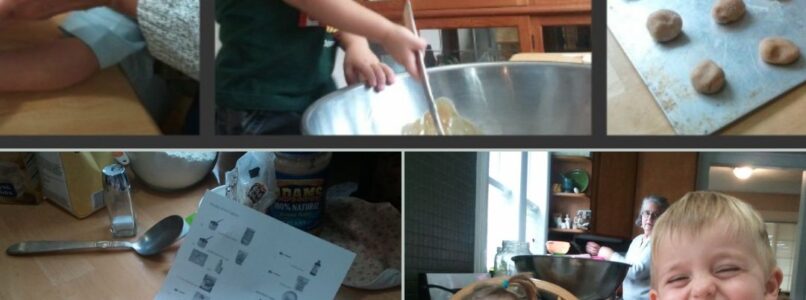
 Let’s pick up where we left off last week. I shared
Let’s pick up where we left off last week. I shared 
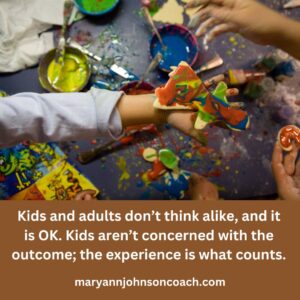 In the article published on
In the article published on
 Thirteen years ago, I had a wonderful evening with my eight-year-old friend, Hailey. It was successful because time had been set apart for the activity, it happened consistently so Hailey could count on it, and I was present. When we want to solidify relationships in our family these three ingredients make all the difference.
Thirteen years ago, I had a wonderful evening with my eight-year-old friend, Hailey. It was successful because time had been set apart for the activity, it happened consistently so Hailey could count on it, and I was present. When we want to solidify relationships in our family these three ingredients make all the difference. 

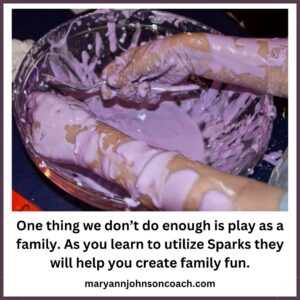 Two weeks ago, I shared
Two weeks ago, I shared 
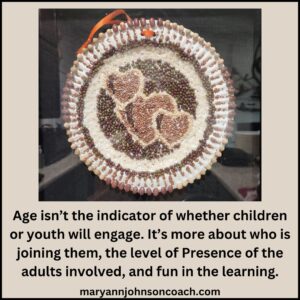 Last week
Last week nine.
nine.
 My hairdresser, Emily, works out of her home. Most of the kids are in school but she has one little guy who is four and still at home during the day. We have fun conversations.
My hairdresser, Emily, works out of her home. Most of the kids are in school but she has one little guy who is four and still at home during the day. We have fun conversations.
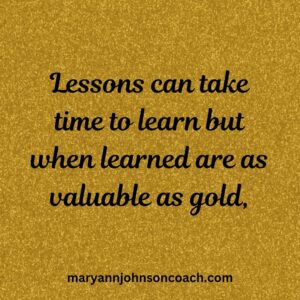 When I lived in Montana with seven children, I was a busy mother. You’re smiling because you know exactly what I mean. A family, regardless of its size, is a handful; lots of cooking, laundry, cleaning, driving people here and there, and so forth. I look back and wonder how in the world I did it all.
When I lived in Montana with seven children, I was a busy mother. You’re smiling because you know exactly what I mean. A family, regardless of its size, is a handful; lots of cooking, laundry, cleaning, driving people here and there, and so forth. I look back and wonder how in the world I did it all.
 On March 3, 2024, I published an article titled
On March 3, 2024, I published an article titled 
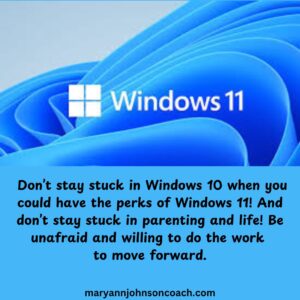 I Don’t Like Change.
I Don’t Like Change.